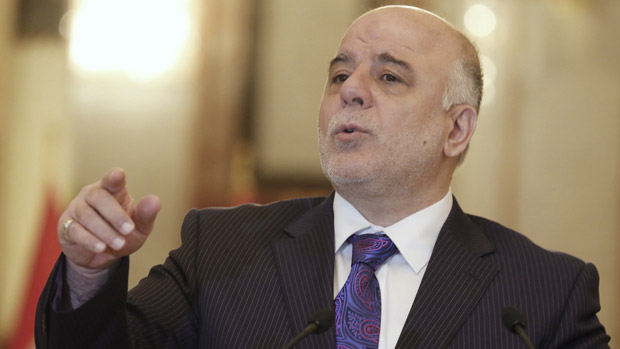Iraq: new government opens way for US military expansion
United States hails new Iraqi cabinet as a milestone in the fight against Islamic State militants

A free daily email with the biggest news stories of the day – and the best features from TheWeek.com
You are now subscribed
Your newsletter sign-up was successful
The creation of new government in Iraq after weeks of negotiations has been hailed as a major milestone in the fight against Islamic State, opening the way for more US military support.
US president Barack Obama was one of the first to congratulate the new Iraqi Prime Minister Haider al-Abadi on forming the new cabinet, which is divided between the Shi'ite majority, Sunnis and Kurds.
Abadi, who has also appointed a deputy from each of the groups, vowed to "allow all people in Iraq to participate in liberating the cities and provinces which have been taken over by terrorist groups... and to bring back security and stability".
The Week
Escape your echo chamber. Get the facts behind the news, plus analysis from multiple perspectives.

Sign up for The Week's Free Newsletters
From our morning news briefing to a weekly Good News Newsletter, get the best of The Week delivered directly to your inbox.
From our morning news briefing to a weekly Good News Newsletter, get the best of The Week delivered directly to your inbox.
The final vote to approve the cabinet did not go entirely smoothly. The Washington Post says it came during a "fiery late-night parliamentary session", with key positions in defence and security left open amid disagreement over who would fill them. Abadi said he would name candidates for those positions within a week.
Secretary of State John Kerry, who is travelling to Saudi Arabia and Jordan in a bid to build a coalition to confront Islamic State, said the new government had the "potential to unite all of Iraq's diverse communities".
The inclusion of Sunnis in the new cabinet is key and it is hoped the move will generate support for Baghdad among the Sunni population in areas controlled by Islamic State and turn them against the extremists, says BBC's Jim Muir.
The US previously made a united Iraqi government one of the conditions for an increase in military assistance. Obama is expected to unveil his strategy to combat the militants tomorrow. He has already sanctioned dozens of air strikes against the militants in Iraq but has ruled out the possibility of a US ground operation.
A free daily email with the biggest news stories of the day – and the best features from TheWeek.com
Muir says the task ahead is "clearly massive", with militants still in control of large swathes of Iraq and Syria. "Among other things, the Iraqi army is in a state of disarray," he says. "And much of the recent fighting has been done by Shia militia, strengthening the element of sectarian civil strife that will have to be eliminated if the Islamic State radicals are to be isolated and crushed, without whole communities being destroyed."
-
 Political cartoons for February 21
Political cartoons for February 21Cartoons Saturday’s political cartoons include consequences, secrets, and more
-
 Crisis in Cuba: a ‘golden opportunity’ for Washington?
Crisis in Cuba: a ‘golden opportunity’ for Washington?Talking Point The Trump administration is applying the pressure, and with Latin America swinging to the right, Havana is becoming more ‘politically isolated’
-
 5 thoroughly redacted cartoons about Pam Bondi protecting predators
5 thoroughly redacted cartoons about Pam Bondi protecting predatorsCartoons Artists take on the real victim, types of protection, and more
-
 Epstein files topple law CEO, roil UK government
Epstein files topple law CEO, roil UK governmentSpeed Read Peter Mandelson, Britain’s former ambassador to the US, is caught up in the scandal
-
 Iran and US prepare to meet after skirmishes
Iran and US prepare to meet after skirmishesSpeed Read The incident comes amid heightened tensions in the Middle East
-
 Israel retrieves final hostage’s body from Gaza
Israel retrieves final hostage’s body from GazaSpeed Read The 24-year-old police officer was killed during the initial Hamas attack
-
 China’s Xi targets top general in growing purge
China’s Xi targets top general in growing purgeSpeed Read Zhang Youxia is being investigated over ‘grave violations’ of the law
-
 Panama and Canada are negotiating over a crucial copper mine
Panama and Canada are negotiating over a crucial copper mineIn the Spotlight Panama is set to make a final decision on the mine this summer
-
 Why Greenland’s natural resources are nearly impossible to mine
Why Greenland’s natural resources are nearly impossible to mineThe Explainer The country’s natural landscape makes the task extremely difficult
-
 Iran cuts internet as protests escalate
Iran cuts internet as protests escalateSpeed Reada Government buildings across the country have been set on fire
-
 US nabs ‘shadow’ tanker claimed by Russia
US nabs ‘shadow’ tanker claimed by RussiaSpeed Read The ship was one of two vessels seized by the US military